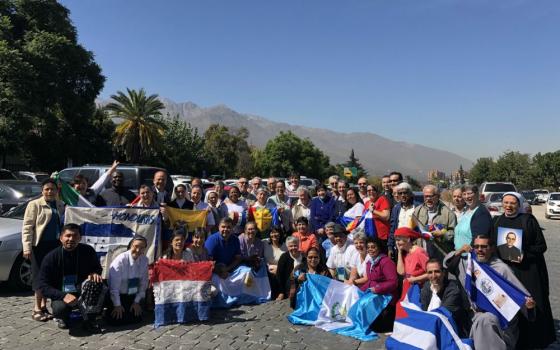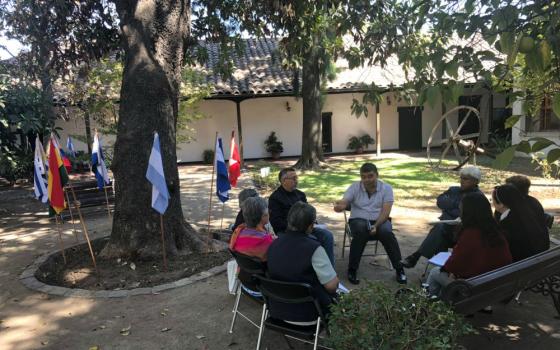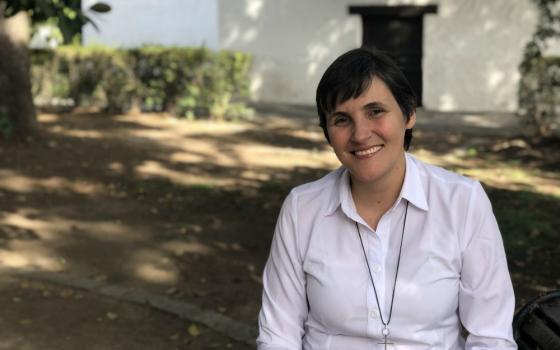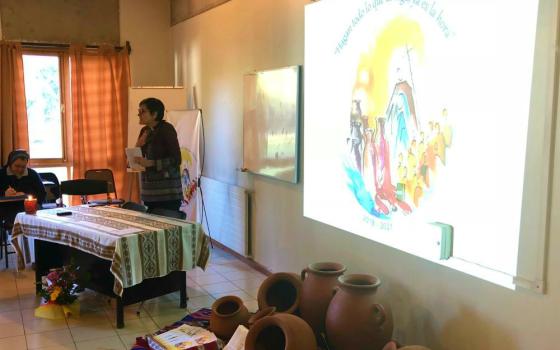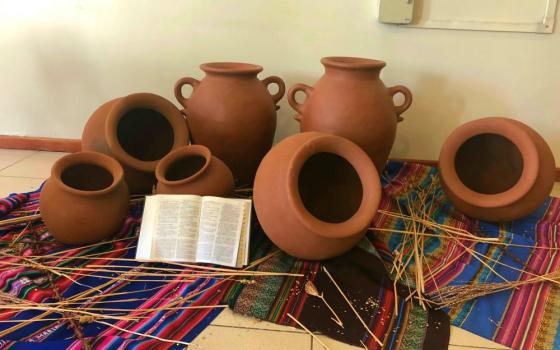When the Confederation of Latin American and Caribbean Religious (CLAR) decided to form a commission geared toward the protection of minors, Sr. Nancy Negrón Ortiz was the logical choice to help lead that effort.
Ortiz, a Missionary Sister of the Good Shepherd (Hermanas Misioneras del Buen Pastor), is a psychologist experienced in working with abused children and is also a member of the CLAR presidency. The Commission for the Protection of Minors, which first met in November in Bogotá, Colombia, established protocols for responding to victims who come forward that each member country's religious conference can adapt to their own local civil laws.
"Creating this commission was an urgent step for CLAR given the realities that our church is living both at the diocesan level and with our religious congregations," Ortiz told Global Sisters Report while she was in Santiago, Chile, for CLAR's annual gathering March 18-20.
Celebrating its 60th anniversary, CLAR selected Santiago as the site of the gathering to show solidarity with Chilean religious as well as the country's victims, "acknowledging the sins of the church while also demonstrating encouragement and hope for those who are part of the church," said Company of Mary (la Orden de la Compañía de María Nuestra Señora) Sr. Liliana Franco, president of CLAR. In 2018, Chile became one of the first Latin American countries where accusations of clergy sexual abuse became public.
CLAR formed four new commissions between September and March to join its existing 12: one for the protection of minors, another to focus on the issue of migration, one devoted to the Amazonian region with a focus on ecological integration, and a fourth created from the separation of the once-combined commission for ministering to Afro and indigenous people.
Ortiz said the Commission for the Protection of Minors was created to help national conferences in two areas specifically: to "raise awareness on the importance of confronting and discussing this difficult subject and to create protocols related to hearing victims, with properly trained staff who can listen to victims and help guide religious congregations to take appropriate action for reporting the situation to the civil level."
"We must work on becoming attuned to the victims' pain, the emotional and spiritual consequences, its impact on their relationships and the trust they've lost in others," Ortiz said. "It's a long process of deep reconstruction within the person, and when we place ourselves there, we realize that our role is preventing more victims who have to live with this experience."
"There is a commitment to create a safe environment so that there is never another victim," Ortiz said.
Following its first continental seminar in November with 76 attendees, the commission sees itself as a facilitator, guiding each country's version of this commission to adapt the protocols to its country's due processes. Ortiz said CLAR's commission can provide information and materials for training, which was one of the first meeting's main objectives: emphasizing the need for properly trained personnel.
"It's also very important that we establish a clear process for handling complaints and concerns as well as providing guidance on what to do if our national religious conferences hear from victims," she said.
Franco said being in Chile for the March gathering was a chance to "touch the wounds" and acknowledge the church's "frailty and sin with humility, to say, 'Yes, we failed,' and to try to make up for the damage and be on the side of the victims."
With the wedding at Cana as its icon for inspiration, CLAR sees transformation as a priority for this triennium. Much like the Gospel story of a wedding that ran out of wine, with Mary beckoning Jesus' first miracle of converting water into wine, members of CLAR see this moment in the church as a celebration brought to a halt by a crisis, calling women to assume leadership and pave the way for a transformation.
"We are a party without wine. That's how we feel today in the church," said Company of St. Teresa of Jesus (Compañía de Santa Teresa de Jesús) Sr. Cristina Robaina, who serves on CLAR's team of advisory theologians. "We come fatigued and discouraged. ... It's like we try to live our lives on the one hand but feel the urgency of this on the other hand, and we've been giving responses that stop meaning anything to anyone anymore."
The cause of the "anguish" did not come from God, Robaina told GSR. "The ruptured link came from humans in the middle of the wedding feast that should have been space for the ecclesial community. While God is telling us that he loves us and wants us to be happy, in the corners of the party are people abusing sexually and abusing their power."
A common phrase repeated throughout the three-day gathering was that Catholics must learn "a new way of being a church." To Franco, that means "a new way of identifying and relating to ourselves as a church."
"We speak of the need for more participation for laypeople, women. We all feel responsible for the construction of the church. ... To speak of a new way of being a church means that at this moment, the church needs to be more humble, that the hierarchs and laypeople understand that we cannot be without the other, that there must be dialogue, that we must meet with other institutions, that communion is fundamental, that there is not isolated protagonism, but a shared experience."
Robaina said one lesson for the church should be "to call things by their name. No more of this 'yes, but, yes, but' business. ... But we also mustn't expect constant purity and perfection from the church."
"Extreme misery is always met by God's extreme mercy," she said. "There is nothing human he cannot understand; nothing he cannot forgive."
[Soli Salgado is a staff writer for Global Sisters Report. Her email address is [email protected]. Follow her on Twitter: @soli_salgado.]
